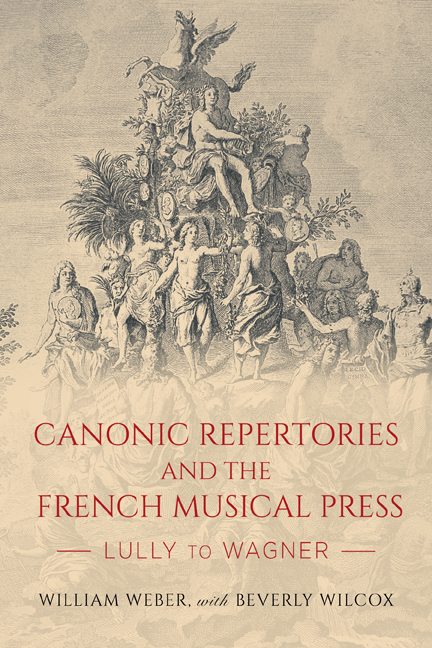Book contents
- Frontmatter
- Contents
- Acknowledgments
- List of Illustrations
- Introduction
- 1 The Domestic versus the Foreign in Eighteenth-Century Paris and London
- 2 Elements of Canon Formation at the Concert Spirituel (Beverly Wilcox)
- 3 To Praise or to Criticize? The Evolution of Music Criticism in Eighteenth-Century France
- 4 Haydn in the Press during the 1780s: How Did a Canon Arise?
- 5 Parallel Canons at the Opéra and the Comédie-Française at the End of the Ancien Régime
- 6 Negotiating Canonic Repertory and les progrès de la musique at the Paris Opéra, 1815–1830
- 7 The Evolution of le vieux répertoire at the Opéra-Comique in the Nineteenth Century
- 8 Richard Wagner, Concert Life, and Musical Canon in Paris, 1860–1914
- An Afterword
- Bibliography
- Index
8 - Richard Wagner, Concert Life, and Musical Canon in Paris, 1860–1914
Published online by Cambridge University Press: 26 May 2022
- Frontmatter
- Contents
- Acknowledgments
- List of Illustrations
- Introduction
- 1 The Domestic versus the Foreign in Eighteenth-Century Paris and London
- 2 Elements of Canon Formation at the Concert Spirituel (Beverly Wilcox)
- 3 To Praise or to Criticize? The Evolution of Music Criticism in Eighteenth-Century France
- 4 Haydn in the Press during the 1780s: How Did a Canon Arise?
- 5 Parallel Canons at the Opéra and the Comédie-Française at the End of the Ancien Régime
- 6 Negotiating Canonic Repertory and les progrès de la musique at the Paris Opéra, 1815–1830
- 7 The Evolution of le vieux répertoire at the Opéra-Comique in the Nineteenth Century
- 8 Richard Wagner, Concert Life, and Musical Canon in Paris, 1860–1914
- An Afterword
- Bibliography
- Index
Summary
Arne Stollberg has suggested that “[t]he case of Wagner provides an extraordinary example how there occurred a sweeping self-canonization of text and music, establishing the author as a future-imagining example.” Wagner's bold proposals can likewise be seen as an effort to create a self-serving canon, as his critics were eager to point out. Historically, the only other composer who guided a major institution solely to perform his own compositions was Jean-Baptiste Lully, who exploited the Académie Royal de Musique from its founding in 1669 as the Académie d’Opéra in rather the same terms. The refusal of the Paris Opéra to perform any of Wagner's works between its production of Tannhâuser in 1861 and the grudging staging of Lohengrin in 1891 placed his music in a special situation, because his music was instead performed widely and enthusiastically in concerts. Opportunistic French musicians exploited public interest in Wagner's music by presenting selections from his operas in concerts as different as formal symphonic programs, opera-oriented benefit concerts, and informal programs by bands in parks.
This chapter will examine the types of concerts where Wagner's music was performed in three periods—the 1860s, the 1880s, and the decade before the First World War. It will compare the programs of these concerts in Paris and in several other cities, identifying the social and musical nature of the events. In many respects the French musical public tended to be isolated from the Wagnerian movement; indeed, both official and public resistance to staging Wagner's works had long-term consequences for what the music meant in French musical experience. The official resistance itself stimulated intense commentary about Wagner, a dialogue that went in directions considerably different from what developed in other countries. An intense debate came about between the self-styled wagnériens and anti-wagnériens in the literary world. But on the whole members of the general public were not involved in such debate; they seemed to shrug a collective shoulder as the music became central to concerts and to French domestic music-making. The French nationalist movement did not hold back interest in Wagner's music for long, despite the riot which occurred outside the Éden-Théâtre when Lohengrin was performed there on May 3, 1887.
- Type
- Chapter
- Information
- Canonic Repertories and the French Musical PressLully to Wagner, pp. 228 - 266Publisher: Boydell & BrewerPrint publication year: 2021



